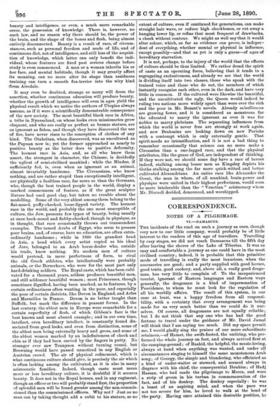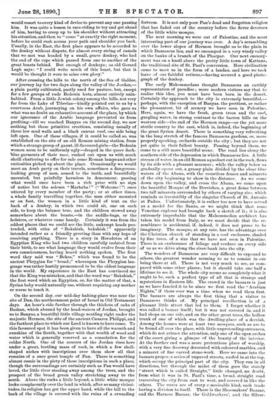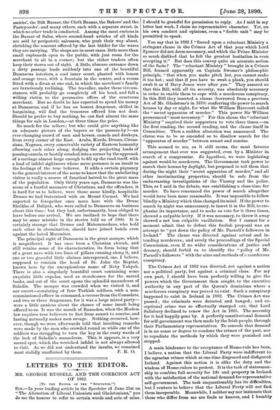CORRESPONDEN CE.
NOTES OF A PILGRIMAGE.
vi.—DAMASCUS.
THE incidents of the road on such a journey as ours, though very new to our little company, would probably be of little interest to the readers of this age of travellers. Travelling by easy stages, we did not reach Damascus till the fifth day after leaving the shores of the Lake of Tiberias. It was as easy and comfortable a journey as one could have in the most civilised country ; indeed, it is probable that this primitive mode of travelling is really the most luxurious, when the accessories are good; and a party supplied with good horses, good tents, good cookery, and, above all, a really good drago- man, has very little to complain of. To the inexperienced tourist, ignorant of Eastern languages and Eastern ways generally, the dragoman is a kind of impersonation of Providence, to whom he must look for the regulation of all his worldly affairs. The result of this system, in our case at least, was a happy freedom from all responsi- bility, with a certainty that every arrangement was being made for us very much better than we could do it our- selves. Of course, all dragomans are not equally reliable; but I do not think that any one who has had the good fortune to travel under the guidance of Mr. David Jamal will think that I am saying too much. Did my space permit me, I would gladly sing the praises of our more subordinate retainers,—of Hamet, the swift-footed, the untiring, who per- formed the whole journey on foot, and always arrived first at the camping-ground ; of Rashid, the helpful, the music-loving, always at hand when anything was wanted, and under all circumstances singing to himself the same monotonous Arab song ; of Georgy, the simple and blundering, who officiated as a kind of under-waiter or steward, and seemed always in disgrace with his chief, the consequential Ibrahim; of Hadj Hassan, who had made the pilgrimage to Mecca, and wore a strip of green in his turban in commemoration of the fact, and of his donkey. The donkey especially : he was a beast of an aspiring mind, and when the pace was not too severe for him, he loved to walk at the head of the party. Having once attained this desirable position, be
would resort to every kind of device to prevent any one passing him. It was quite a lesson in race-riding to try and get ahead of him, having to creep up to his shoulder without attracting his attention, and then to " come " at exactly the right moment, before he could rush across your path and shoulder you back. Usually, in the East, the first place appears to be accorded to the donkey without dispute, for almost every string of camels that we met was headed by a small, grave donkey, who had the end of the rope which passed from one to another of the great beasts behind. But enough of donkeys ; as old Gerard Legh says : "I could write much of this beast, but that it would be thought it were to mine own glory."
After crossing the hills to the north of the Sea of Galilee, our journey lay for two days along the valley of the Jordan,— a plain partly cultivated, partly used for pasture, but, except for a few groups of rude Bedouin huts, almost entirely unin- habited. From a little Jewish colony among the hills, not very far from the Lake of Tiberias—kindly pointed out to us by a .courteous Arab, journeying on his own affairs, who gave us what was no doubt an exhaustive account of the place, by which our ignorance of the Arabic language prevented us from profiting—till we reached Banyas on the second day, we saw -nothing but these primitive erections, consisting usually of three low mud walls and a black canvas roof, one side being left open. One of these villages, if it could be called so, was established on the site of an old Roman mining station, from which a strange group of gaunt, ill-favoured girls—the Bedouin women seem to be uniformly ugly—draped in the queer dark- 'blue garments of their race, rushed out upon us with much -shrill chattering to offer for sale some Roman lamps and other curiosities picked up about the place. Occasionally we would meet an Arab party on their travels, sometimes a dangerous- looking group of men, armed to the teeth, and beautifully -mounted, but painfully harmless in demeanour, passing what would once have been a rich prize with no sign -of notice but the solemn " Marhaba!" (" Welcome !") once uttered by every member of the party; or at other times, a whole family travelling together, the men either mounted or on foot, the women in a little kind of tent on the back of a donkey, in which two could sit, one on each side, to keep the balance true, and the children stowed away -somewhere about the beasts,—in the saddle-bags, or the holsters, or whatever came handy. Certainly it was from the .oddest places that we could see the little, unkempt heads pro- truded, with cries of " Bakshish, baksbish !" apparently intended rather as a friendly greeting than with any hope of -receiving anything. There is a story in Herodotus of an Egyptian King who had two children carefully isolated from their birth, to see what language they would evolve from their own consciousness, having heard nothing spoken. The first word they said was " Bekos," which was found to be the ancient Phrygian for " bread;" whereupon the Phrygian lan- guage was rather hastily pronounced to be the oldest language in the world. My experience in the East has convinced me that the King was mistaken, and that the word was " Bakshisht the first word which an Egyptian, or, for the matter of that, a Syrian baby would naturally use, without requiring any mother or nurse to teach it.
On the second day, our mid-day halting-place was near the site of Dan, the northernmost point of Israel in Old Testament days. An hour's ride further through the thickets of oaks of Bashan, which abound by the head-waters of Jordan, brought us to Banyas, a beautiful little village nestling right under the majestic Hermon, the site of the ancient Caesarea Philippi, and the furthest place to which our Lord is known to have come. To this favoured spot it has been given to have all the warmth and sunshine of the South, together with that wealth of wood and water which is generally reserved as a consolation for the colder North. One of the sources of the Jordan rises here under a great, beetling mass of rock, in which a few shell- shaped niches with inscriptions over them show all that remains of a once great temple of Pan. There is something almost comic in the piety of these inscriptions in such a place, though the surroundings are certainly such as Pan would have loved, the little river stealing away among the trees, and the prospect of the broad green valley stretching away to the south. Above the rocks a little beyond, a little white mosque looks complacently over the land in which, after so many vicissi- tudes, its religion has got the upper hand, while the hill to the back of the village is covered with the rains of a crusading fortress. It is not only poor Pan's dead and forgotten religion that has faded out of the country before the fierce devotees of the little white mosque.
The next morning we were out of Palestine, and the most interesting part of our journey was over. A day's scrambling over the lower slopes of Hermon brought us to the plain in which Damascus lies, and we encamped in a very windy valley on the banks of a branch of the Pharpar. Our next encamp- ment was on a knoll above the pretty little town of Kaftans, the traditional site of St. Paul's conversion. Here civilisation came to meet us in the form of a landau, and here we took leave of our faithful retinue,—having secured a good photo- graph of the donkey.
The early Mahommedans thought Damascus an earthly representation of paradise ; more modern visitors say that to realise this idea, you must have been born in the desert. Certainly the approach to the city is extremely beautiful,— perhaps, with the exception of Banyas, the prettiest, or rather the pleasantest, bit of scenery we have seen in Palestine. Here, again, we have the fresh, green trees and the cool, gurgling water, in strong contrast to the barren hills on the western side—the end of the Hermon range—or the yet more sterile country to the east, which is, indeed, the beginning of the great Syrian desert. There is something very refreshing in the long stretch of the famous Damascus gardens, or, more properly speaking, orchards outside the city ; but they are not yet quite iu their fullest beauty. Passing beyond them, we come to a still more beautiful scene. The road lies along the southern aide of the depression in which Damascus lies. A little stream of water, in an old Roman aqueduct cut in the rock, flows by its side with a pleasant murmur; while the valley below us gradually opens out, a grassy plain divided by the clear blue waters of the Abana, with the countless domes and minarets of the city beginning to show in the distance. As we come down upon the valley, and cross the Abana, we come upon the beautiful Mosque of the Dervishes, a great dome between two tall minarets surrounded by others of varying size, which reminds us irresistibly of the singular Church of St. Antonio at Padua. Unfortunately, it is rather too new to have served as a model for the Santo, or we might think that some Venetian explorer had brought back a sketch of it ; it is also extremely improbable that the Mahommedan architect has taken his model from Italy, so we must decide that the re- semblance is accidental, if, indeed, it does not prove to be imaginary. The mosque, at any rate, has the advantage over the Christian church of standing in a cool enclosure, shaded by fine trees, of a size that we have not seen in Palestine. There is an exuberance of foliage and verdure on every side of us as we drive along the river-bank into the city.
The wonders of Damascus are very difficult to expound to others, the greatest wonder seeming to us to consist in our being there at all. There is not very much to see, as com- pared with some other places ; but it should take one half a. lifetime to see it. The whole city seems so completely what it ought to be, such a perfect type of all that is strange and mysterious in Eastern life. The crowd in the bazaars is just as we have fancied it to be since we first read the " Arabian Nights," if there ever was a time when we read them first. The bazaars are always the first thing that a visitor to Damascus thinks of. My principal recollection is of a pleasant little street that led to them. I forget whether it was called a bazaar itself ; but it was not covered in, and it had shops on one side, and on the other great trees, the hollow trunk of one of which was the dwelling-place of a dervish. Among the houses were at least two mosques, such as are to be found all over the place, with little unpretending entrances, which do not attract the attention, only one of the open arches of the court giving a glimpse of the beauty of the interior. At the further end was a more pretentious place of worship, with a very fine doorway decorated with coloured marbles, and a minaret of fine carved stone-work. Here we came into the bazaars proper, a series of unpaved streets, roofed in at the top, which occupy the principal part of the city. They run in all directions, but through the midst of them goes the stately " street which is called Straight," little changed, no doubt, from what it was in St. Paul's time, a broad, straight road traversing the city from east to west, and covered in like the others. The wares are of every c mceivable kind, each trade having a division to itself. There is the Shoemakers' Bazaar, and the Harness Bazaar, the Goldworkers', and the Silver-
smiths', the Silk Bazaar, the Cloth Bazaar, the Bakers' and the Pastrycooks', and many others, each with a separate street, in which no other trade is conducted. Among the most curious is the Bazaar of Sales, where second-hand articles of all kinds are sold by peripatetic salesmen, who push their way about, shrieking the amount offered by the last bidder for the wares they are carrying. The shops are in most cases little more than small cupboards open to the public, with just room for the merchant to sit in a corner; but the richer traders often keep their stores out of sight. A little, obscure entrance down a dirty passage leads suddenly into one of the beautiful Damascus interiors, a cool inner court, planted with lemon and orange trees, with a fountain in the centre, and a recess fitted with a divan at one end, in which the merchant's family are luxuriously reclining. The traveller, under these circum- stances, will probably go completely off his head, and fall a willing :victim to the persuasive offers of the courteous merchant. But no doubt he has expected to spend his money at Damascus, and if he has an honest dragoman, skilled in bargaining, will find the treasures offered him not dear. Should he prefer to buy nothing, he can find almost the same things for sale in London,—at three times the price.
So much for the sellers; but who could give anything like an adequate picture of the buyers or the passers-by P—an ever-changing crowd of men and horses, camels and donkeys, from every corner of the East. Arabs, Kurds, Drums, Circas- sians, Negroes, every conceivable variety of Eastern humanity elbowing each other along, dodging the projecting loads of passing camels, or hastily crushed into a corner by the approach of a carriage almost large enough to fill up the road itself, with a load of infidel sightseers whose mere presence is an insult to the feelings of the true believer. It adds a certain piquancy to the general interest of the scene to know that the unbelieving visitor is really a source of fanatical hatred to the great mass of the population. Only thirty years ago, Damascus was the scene of a fearful massacre of Christians, and the offenders, it is hard for us to believe, were those same kindly, hospitable Druses we had fraternised with on Mount Carmel. We had expected to foregather once more here with the Druse Sheikhs of Daliyeh, who were called to Damascus on business about this time ; but they had, unfortunately, been obliged to leave before our arrival. We are inclined to hope that there may be some mistake in the stories told us of 1860. It is certainly strange that Druses and Mahommedans, who hold each other in abomination, should have joined hands even against the hated Maronites.
The principal sight of Damascus is the great mosque, which is magnificent. It has once been a Christian church, and still retains some of its characteristics, its form being that of a great nave with two lines of pillars running along it, and one or two graceful little shrines interspersed, one, I believe, supposed to contain the head of St. John the Baptist, known here by the uneuphonious name of Neby Yahyah. There is also a singularly beautiful court containing some exquisite little cupolas, used as storehouses for the sacred books, and out of the court opens the splendid mausoleum of Saladin. The mosque was crowded when we visited it, and our escort—consisting of four Turkish soldiers, with a non- commissioned officer in command, a cavasse from the Consulate, and two or three dragomans, for it was a large mixed party— were a little anxious about the chance of some insult being offered to us. It was the month of Ramadan, when the Moslem law requires true believers to fast from sunset to sunrise, and fasting naturally makes men savage. Nothing occurred, how- ever, though we were afterwards told that insulting remarks were made by the men who crowded round us while one of the soldiers was struggling to turn the key in the rusty wards of the lock of Saladin's mausoleum. This, it appears, is a very sacred spot, which the wretched infidel is not always allowed to visit. As we did not understand the insults, we remained




















































 Previous page
Previous page